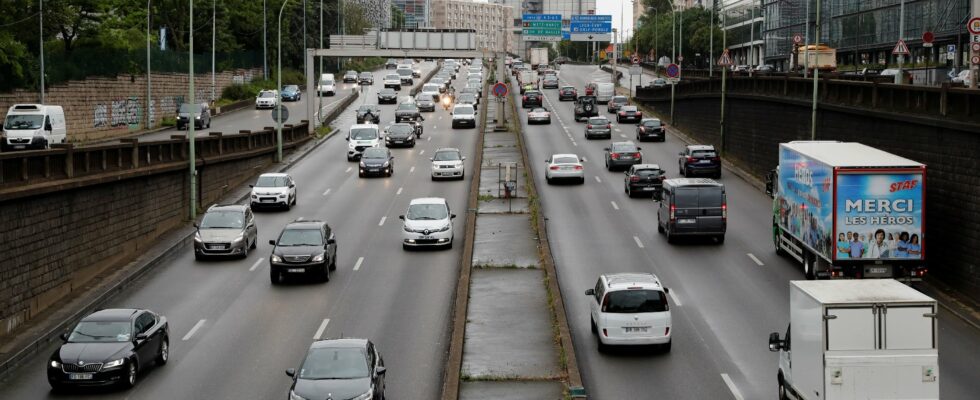The measure was in the pipeline, it will now soon be effective. Paris Mayor Anne Hidalgo assured on Monday, September 9 that the speed limit on the Paris ring road will soon be limited. “For the 50 km/h, that is my decision. It will be on October 1. We have been working on it for 18 years, so it is not a new subject,” declared Anne Hidalgo on RTL.
The city hall led by the socialist had indicated at the end of November 2023 its desire to limit the speed on the ring road to 50 km/h after the Olympic and Paralympic Games, which ended on Sunday. The maximum speed allowed on this 35-kilometer road belt surrounding the capital since 1973 had already dropped from 90 km/h to 80 in 1993, then to 70 in 2014. Since 2021, the speed has also been limited to 30 km/h in most of the streets of the capital.
The Paris city hall intends, through this measure, to reduce pollution and noise pollution, particularly at night for the 500,000 people who live in the immediate vicinity of this axis, often in working-class neighborhoods. “This is a public health measure for the 500,000 people who live near the ring road,” Anne Hidalgo said in an interview at West France August 31st.
No impact study carried out
However, no impact study has been carried out on this subject, as deplored by the president of the Île-de-France region, Valérie Pécresse. This point was also raised by the former Minister of Transport, Clément Beaune: “There is a problem, which is that there has been no impact study,” he indicated on France 3 in June 2023. “If it is to create more congestion, it is not very ecological,” he estimated. “If it makes it possible to streamline carpooling and bus transport and other uses, I think that it is positive and we must look at it. But a prior impact study is needed.”
“While the environmental gain of a reduction from 130 to 110 km/h is demonstrated, that of 90 to 70 is already very questionable both in terms of NO2 (nitrogen dioxide) pollution and in terms of noise”, estimated five Parisian elected officials from the right, including senator Agnès Evren, in a platform in Figaro published in December 2023. “None of the published studies have ever demonstrated the benefit of a reduction from 70 to 50 km/h,” they also argued.
The nuances of Ademe
In a study on the “impacts of speed limits on air quality, climate, energy and noise”, published in February 2014, Ademe (the French Environment and Energy Management Agency) noted that it is “generally considered that reducing speed reduces fuel consumption and unit pollutant emissions”. However, “several other factors come into play (type and age of vehicles, road gradient, load, traffic flow, traffic conditions, etc.) which makes the relationship between speed and air pollution more complex”.
In the conclusion of this study, Ademe wrote that, “above 70 km/h, speed reductions have a rather positive effect on particle and nitrogen oxide emissions”. Below 70 km/h, on the other hand, “this effect is rather negative”. “In practice, the situation is more complex since it is necessary to take into account in particular the effect of the speed limit on congestion. The change from 80 to 70 km/h on a congested road is a step in the right direction for air quality, because it promotes traffic flow”. According to Ademe, the analysis of the real impacts on air quality of speed limits “tends to show gains” for high speeds and “a much more contrasting situation” for lower speeds, in particular the change from 50 to 30 km/h.
Noise reduction
Asked by West FranceKarine Léger, director of AirParif, the organization that measures air quality in Île-de-France, specifies that “there is an optimum between 30 and 70 km/h concerning pollutant emissions”. In other words, with a speed limit between 30 and 70 km/h, the impact on air quality is similar. “The reduction alone of a limitation to 50 km/h instead of 70 will have a very limited impact on air pollution”, except for the oldest vehicles, indicates the engineer specialized in environment.
Improving air quality is “not the first effect expected” by Anne Hidalgo and her team with this initiative, notes West France David Belliard, deputy mayor of Paris, in charge of transforming public spaces, transport and mobility. The main health benefit lies in reducing noise. “Noise pollution is poisoning the lives of residents near the ring road,” says David Belliard. Last January, this elected environmentalist indicated that, since 2014, residents living near the urban motorway have experienced a “reduction in noise pollution, particularly at night: a little over one decibel less at night, and 0.5 decibels during the day.”
Furthermore, safety is another argument put forward to justify lowering the speed limit. According to several works of the Center for Studies and Expertise on Risks, the Environment, Mobility and Planning (Cerema), the “impact will be twice as violent” at 70 km/h rather than at 50 km/h. “We know that a reduction in speed reduces the risk of an accident,” notes David Belliard. “There is therefore a question of public health for residents close to the ring road, but also of road safety for users.”
